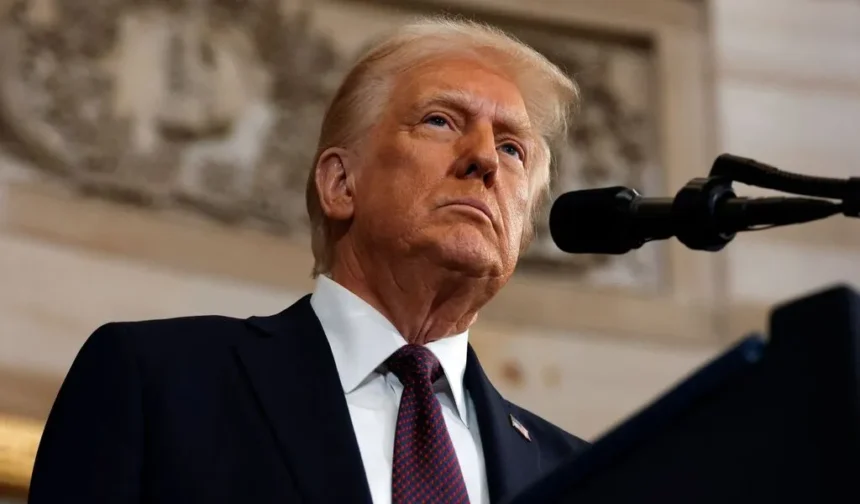US President Donald Trump is intensifying his efforts to impose tariffs on exports from nations that he contends have unfair trade policies to the United States.
On Thursday, Trump signed a memo directing staff to create custom tariffs for each country, considering their current tariffs, exchange rates, trade balances, and other regulations.
The Trump administration singled out the European Union for other policies that it claimed placed US exporters at a disadvantage, stating that tariffs imposed by other countries were not necessarily the most significant issue in outlining its concerns.
The announcement is expected to initiate trade negotiations worldwide, even though significant doubts remain regarding the plans.
The president’s memo requested that staff submit a proposal for “reciprocal trade and tariffs” within 180 days.
Howard Lutnick, the Secretary of Commerce, stated that his staff would be prepared to present a plan to the president by April 1.
The Economic Impact of Trump’s Tariff Moves on the US Economy
Trump presented his proposal for reciprocal tariffs as an element of his initiative to attract investment and stimulate manufacturing in the United States.
“There are no tariffs if you construct your product in the United States,” he stated, stating that he was “merely following the law.”
“In almost all cases, they’re charging us vastly more than we charge them, but those days are over,” he said. “This should have been done a long time ago.”
Trump’s actions are anticipated to affect trade relations with countries such as India, Vietnam, and Thailand, which have relatively higher tariffs and depend on the United States as a significant export market and the European Union.
Trump signed the memo before a meeting with Indian Prime Minister Narendra Modi. Modi has already implemented measures to reduce tariffs on critical products, including motorcycles, which were a point of contention during Trump’s first term.
In the past few days, officials in Thailand and Vietnam have also stated that they are currently reviewing their commercial relations with the United States.
The European Union was committed to “maintaining a close partnership with the US” before Trump’s announcement.
Olof Gill, the commission’s spokesperson for trade, stated, “We will persist in our pursuit of constructive engagement.” “At the same time, we stand ready to protect our interests.”
A tariff is a tax collected by the government on imports. The company that imports the product is responsible for paying for it.
To safeguard specific sectors from foreign competition, countries frequently implement tariffs.
In the past, the United States has advocated for free trade and maintained minimal tariffs on most of its products, except specific items like steel, aluminium and footwear.
According to the World Trade Organisation (WTO), the United States has an average tariff rate of 3.4%, while Europe has an average rate of 5%.
The White House cited objections to tariffs, such as the 10% tax that US-made cars face in Europe, in its plan to establish its policies. This contrasts with the 2.5% tariff that the United States imposes on cars imported into the country.
The White House also stated that Brazil imposes an 18% tariff on ethanol imports, whereas the United States imposes a 2.5% tariff on the same product.
However, officials have stated that the United States intends to employ tariffs to challenge more distant policies.
They have cited concerns regarding the digital services taxes that numerous countries, such as Canada and the United Kingdom, have implemented against Big Tech firms, many of which are based in the United States, as well as Europe’s regulations for its Value Added Tax (VAT), a form of sales tax.
The new administration’s announcement on Thursday follows a series of tariff-related actions.
Trump ordered the United States to impose a 25% import tariff on all steel and aluminium imported into the country earlier this week, thereby eliminating exemptions for countries such as the European Union, the United Kingdom, and Brazil. That is scheduled to take effect next month.
He also threatened to impose 25% tariffs on imports from Canada and Mexico and increased tariffs on all commodities from China to 10%. However, this plan has been suspended until March.
The absence of imminent tariffs resulted in a surge in Wall Street shares.
John Cassidy, the CEO of Red Cedar Investment Management, stated that Wall Street was “unnerved” by Trump’s succession of rapid-fire tariff announcements, as it “does not like the unknown.”
However, he cautioned against overreacting, pointing out that the tariffs that Trump implemented during his first term had a relatively minor effect on the US economy.
“I think Trump’s playing a hand here and I think he’s got a very strong hand to play.” He asserted.
Nevertheless, Alex Durante, an economist at the Tax Foundation, stated that the potential consequences of Trump’s actions were yet to be determined.
He does not believe that tariffs are the most effective approach to addressing trade complaints, as they introduce costs and uncertainty for US firms and risk retaliation.
“I think we’re inching towards more and more tariffs with each coming week and further escalation of a trade war with other countries,” according to him.
He observed that Trump withdrew from the Trans-Pacific Partnership during his first term, a free trade agreement designed to resolve some of these issues with Asian countries.
“They were open to doing this without having to put the US through more trade uncertainty,” according to him.
What Do Economic Experts Think About Trump’s Tariff Strategy?
Trump has dismissed concerns regarding collateral trade damage, asserting that his strategies will increase manufacturing in the United States in the long term.
“What’s going to go up is jobs are going to go up,” according to him. “Prices could go up somewhat short term, but prices will also go down.”
However, surveys suggest that the American public continues to be apprehensive about the cost of living and is sceptical of the advantages of tariffs, which economists have cautioned are likely to increase prices for US businesses and households.
According to a recent Marquette Law School poll, just 24% of respondents, including just under half of Republicans, 12% of independents, and 4% of Democrats, believe that tariffs will benefit the US economy.
“The question is whether these tariffs will result in increased inflation and the cost of goods,” stated the poll’s director, Charles Franklin. “The fairness argument is probably good for the president to make, but the price impact is much more of a hard thing to sell”.

Salman Ahmad is known for his significant contributions to esteemed publications like the Times of India and the Express Tribune. Salman has carved a niche as a freelance journalist, combining thorough research with engaging reporting.














